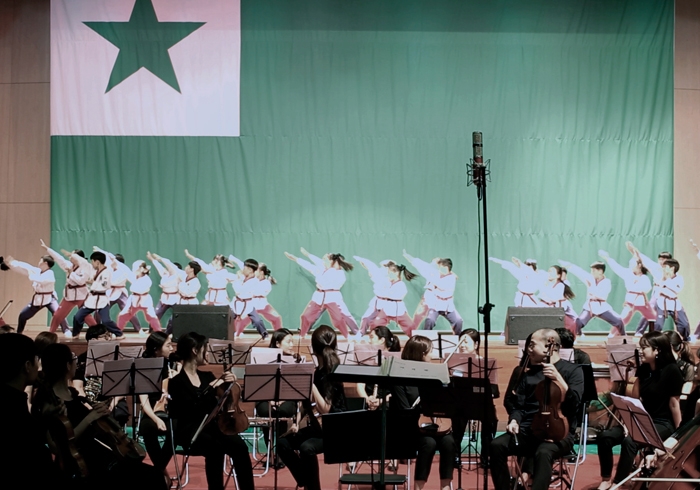Sometimes it’s not about a person or a career; it’s simply about a single work that provides you with an experience so rich that you can spend months or even years digesting it. And sometimes you encounter it in a Budapest basement during last year’s Off-Biennale. That’s where I stumbled into Artificial Act. Research for a Film (2017–), an ongoing videowork by Berlin-based Italian Giulia Bruno. I knew nothing about her. Later, when I looked her up, I found out that she had a degree in biology, and then studied photography and video in Milan. More recently she’s been a part of the Anthropocene Project at the HKW in Berlin and has collaborated with artist Armin Linke. Before I looked her up I sat on a rug in the basement and spent a little over 40 minutes watching this latest version of Artificial Act, and then another 20 minutes watching bits of it again. And not just because my legs had fallen asleep either.
Artificial Act is a video about Esperanto, the language developed in the late nineteenth century by L.L. Zamenhof, a Polish ophthalmologist from Białystok; it’s spoken by around two million people today. Zamenhof (who wrote about his invention under the pseudonym Doktoro Esperanto – hence the name) wanted it be an international language that would remove the hassle of learning multiple foreign tongues, overcome the cultural and social divisions caused by those tongues and promote some version of international harmony. More generally, Artificial Act is a film about language and power, its narrative built up around a dizzying network of connections that implicates everything from morphology and linguistics to twentieth-century utopianism and postcolonial theory. Visually that means that we encounter professors of English from universities in Jamaica and Connecticut, a museum devoted to the 1955 Afro-Asian Bandung Conference in Indonesia, a series of Fiat technical manuals in Esperanto (which the company published in some of its markets until the late 1970s to save itself the hassle…), the 2017 World Esperanto Congress in Seoul (which staged a side meeting in parliament about Esperanto and Korean unification) and a small martial-arts demonstration by children. Watching all this was like witnessing the mapping out of some sort of backdoor globalisation, or, more simply, to be like Alice tumbling down the rabbit hole. And if your initial thought was that the subject of the video might be a little obscure and whimsical, 40 minutes later it seemed to be connected to every key issue of the age of globalisation: internationalism, nationalism, colonialism, marketing, cost-saving, power relations, cross-border economics and identity formation in its necessary and contingent states. The ability to do that is a rare art.
Bruno’s previous video is titled Capital (2014); it’s about the politics of drinking water. And I’m looking forward to spinning down that plughole next. Presumably I’ll emerge in time to witness the final version of Artificial Act.
Giulia Bruno lives in Berlin and works with film and photography. After graduating in biology from the Università degli Studi, she studied photography at CFP Bauer and cinema at Civic School of Cinema, all based in Milan. Her artistic research focuses primarily on the interaction between identity, space and technology. She has collaborated with French philosopher Bruno Latour, photographer and filmmaker Armin Linke, and on projects at the Karlsruhe University of Arts and Design and ETH Zürich University
Mark Rappolt is editor-in-chief of ArtReview and ArtReview Asia
From the January & February 2018 issue of ArtReview, in association with K11 Art Foundation
